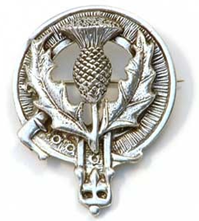|
Donald MacLean's
Farewell to Oban was composed by Archibald
MacNeill, a blind piper from the island of Gigha. It is said
(perhaps apocraphylly) that Donald Maclean came to Oban to
compete for a piping trophy, but when his performance failed to
inspire the judges to award him a prize commensurate with his
own perceptions of his skill, he left in a huff. Musicologist
and indexer Charles Gore has remarked that Scottish accordion
player Phil Cunningham brings Shetland fiddler Aly Bain to Oban
on occasion and they play - as an encore - "Donald McLean's
Farewell to Oban" with a couple of "bum notes" thrown in at
carefully chosen intervals, perhaps "to illustrate his
distemper...or maybe it's an indication that he (MacLean) wasn't
that good and the judges were right."
Oban
(An
t-Oban in
Gaelic meaning
Little Bay)
is a resort town in Argyll and
Bute,
Scotland.
Despite its small size, it is the largest town between
Helensburgh and
Fort
William.
During World War II, Oban was a busy port
used by merchant and Royal Navy ships. The RN had a signal
station near Ganavan which is now a private house. Also near
Ganavan was a anti-submarine indicator loop station which
detected any surface or submarine vessels between Oban,
Mull and Lismore. There was a controlled minefield
in the Sound of Kerrera which was controlled from a building
near the caravan site at Gallanach.
Pipe Major Donald MacLean
(shown above) was born in 1908, his interest in the pipes began
in 1916 when his older brother Murdo took up the instrument to
help in the recovery of a lung wound suffered in the Great War.
Donald borrowed his brother’s chanter and soon both were being
taught.
He joined the Seaforth Highlanders
at age 18 in 1926 and was posted to Aldershot, where he came
under the strong influence of Pipe Major, D. R. MacLennan,
half-brother of the famous G. S. In 1931, while a Corporal with
the 1st Seaforths, he earned his Pipe Major’s Standard
Certificate at the Army School of Piping under Willie Ross and
became pipe major of the 2nd Battalion Seaforths in 1936 – the
youngest pipe major in the British army at that time. His piping
pedigree would also include piobaireachd studies with Angus
MacPherson, son of Calum Piobaire. Donald MacLeod started him on
piobaireachd during the war as a way to strengthen his fingers
for light music playing. Big Donald became later became
particularly well known as a march player.
On June 12, 1941, he, along with the
likes of Donald MacLeod, John Wilson, George McIntyre and many
other pipers in the 51st Highland Division, were captured in
France at St. Valery. He would spend the next five years as a
prisoner of war in Germany and Poland. At war’s end he took over
the Scottish Command School of Piping, then moved to the
Highland Brigade training school, finally retiring from the army
in 1948 after 22 years.
He was renowned for his powerful fingers and
robust instrument, which only he could blow. MacNeill again:
“His instrument was a legend itself and few pipers could blow
it. Those who did were never quite the same afterwards."
He won the Gold Medal at Oban in 1951 with
“MacDonald’s Salute” and at Inverness in 1953 with “Black
Donald’s March,” and later become a regular adjudicator at the
games and major gatherings. In 1954 he visited Canada with
dance-band accordionist Bobby MacLeod at the request of the B.C.
Pipers’ Association and was a huge success.
He
was an excellent Highland dancer, and he taught piping and
dancing in Skye for some years before being offered the job of
managing instruments at the R. G. Lawrie company in Glasgow. Ads
for this company during the 1950s and 1960s feature Donald
MacLean’s iconic photo, unmistakable because he played with his
right hand on top. If there was a 'Best Dressed Piper' award at
a games he attended, he usually won it.
On
August 29, 1964, after attending the Cowal games, he collapsed
on the street in the town of Innellan near Dunoon. Resuscitation
efforts failed and he died before the ambulance arrived. He was
56.
|



